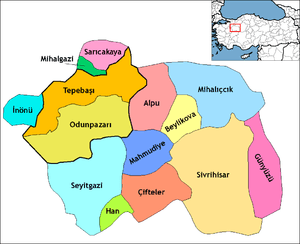İnönü, Eskişehir
İnönü is a town and district of Eskişehir Province in the Central Anatolia region of Turkey. According to 2009 census, population of the district is 7,228 of which 3,980 live in the town of İnönü.[3] The district covers an area of 358 km2 (138 sq mi), and the average elevation is 840 m (2,756 ft).
İnönü | |
|---|---|
District | |
 Location of İnönü, Eskişehir within Turkey. | |
 İnönü Location of İnönü, Eskişehir within Turkey. | |
| Coordinates: 39°49′N 30°09′E | |
| Country | |
| Region | Central Anatolia |
| Province | Eskişehir |
| Government | |
| • Governor | İlhan Abay |
| • Mayor | İsmail Karaköse (CHP) |
| Area | |
| • District | 341.01 km2 (131.66 sq mi) |
| Elevation | 840 m (2,760 ft) |
| Population (2012)[2] | |
| • Urban | 3,966 |
| • District | 7,172 |
| • District density | 21/km2 (54/sq mi) |
| Time zone | UTC+2 (EET) |
| • Summer (DST) | UTC+3 (EEST) |
| Postal code | 26670 |
| Area code(s) | 222 |
| Licence plate | 26 |
| Website | www.inonu.bel.tr |
History
During the western front (also known as the Greco-Turkish War (1919–22) of the Turkish War of Independence in 1921, the First and Second Battles of İnönü took place near the town between the Turkish and the Greek forces. The battles were named after the town, and İsmet İnönü, the Turkish commanding officer during the battles and future President and Prime Minister of Turkey, was given his surname in honor of his services during the battles.
Before it became a district in 1987, İnönü belonged to Söğüt district of Bilecik Province in 1922. Afterwards, it became part of Bozüyük district in 1926 and central district of Eskişehir Province in 1963. İnönü was a township center until 1987.
Notes
- "Area of regions (including lakes), km²". Regional Statistics Database. Turkish Statistical Institute. 2002. Retrieved 2013-03-05.
- "Population of province/district centers and towns/villages by districts - 2012". Address Based Population Registration System (ABPRS) Database. Turkish Statistical Institute. Retrieved 2013-02-27.
- Statistical Institute
References
- Falling Rain Genomics, Inc. "Geographical information on İnönü, Turkey". Retrieved 2008-04-04.
- Governorship of Eskişehir, Turkey. "General information on İnönü, Eskişehir" (in Turkish). Archived from the original on 2007-11-19. Retrieved 2008-04-04.